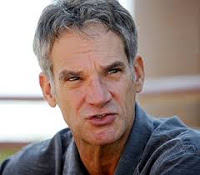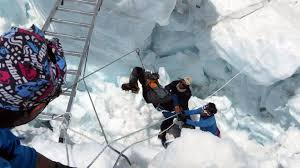During a recent interview with The Huffington Post, Jon Krakauer said his 1996 climbing of Mount Everest was a mistake. This is startling because in his 1997 book Into Thin Air, he explains that reaching that summit was a dream he’d had all his life. In many ways, it even seemed that everything he’d done up to that point had led him to fulfill that dream, and his book describes how he was one of few people in his climbing team to reach the top and survive. Given that Krakauer is famous for surviving that tragic climb and writing a book about it, it’s particularly telling that he said:
 |
| Jon Krakauer |
Climbing Mt. Everest was the biggest mistake I’ve ever made in my life. I wish I’d never gone. I suffered for years from PTSD and still suffer from it. I’m glad I wrote a book about it, but you know if I could go back and relive my life, I would never have climbed Everest.
This man fulfilled a lifelong dream. He achieved international recognition by reaching the top of the biggest mountain in the world, and he regrets it. It’s stunning and it goes against some of our most quintessential American attitudes: follow your dreams, don’t give up, take pride in your accomplishments. Why does he feel this way?For the most detailed answer, read his book, Into Thin Air: A Personal Account of the Mt. Everest Disaster. It’s clear that Krakauer carries a lot of survivor’s guilt about the horrific events of May 1996. The first time I read his book, I simply read it as an adventure story, and it’s definitely a page-turner. But after hearing him say he regrets being a part of that climb, I re-read it and this time I saw why he wishes he hadn’t gone.
This time I noticed Krakauer’s subtle criticism of the culture of Everest-climbing. Sometimes it’s no more than mentioning the salaries of the guides and porters that help clients who pay $65,000 each to reach the summit (in 1996 guides might have earned $10,000 to $15,000 for a single climb. Porters earned no more than $2,500). Sometimes it’s his description of the illnesses people risk at high altitudes, such as brain swelling, hypoxia, and dementia. But more directly he points out that in order to reach the top of Mt. Everest, you need an almost delusional view of your physical strength and stamina and you can’t be slowed by even serious symptoms of altitude sickness, frostbite, intestinal illness, etc. He writes,
The ratio of misery to pleasure was greater by an order of magnitude than any other mountain I’d been on; I quickly came to understand that climbing Everest was primarily about enduring pain. And in subjecting ourselves to week after week of toil, tedium, and suffering it struck me that most of us were probably seeking, above all else, something like a state of grace.
This time I noticed Krakauer’s subtle criticism of the culture of Everest-climbing. Sometimes it’s no more than mentioning the salaries of the guides and porters that help clients who pay $65,000 each to reach the summit (in 1996 guides might have earned $10,000 to $15,000 for a single climb. Porters earned no more than $2,500). Sometimes it’s his description of the illnesses people risk at high altitudes, such as brain swelling, hypoxia, and dementia. But more directly he points out that in order to reach the top of Mt. Everest, you need an almost delusional view of your physical strength and stamina and you can’t be slowed by even serious symptoms of altitude sickness, frostbite, intestinal illness, etc. He writes,
The ratio of misery to pleasure was greater by an order of magnitude than any other mountain I’d been on; I quickly came to understand that climbing Everest was primarily about enduring pain. And in subjecting ourselves to week after week of toil, tedium, and suffering it struck me that most of us were probably seeking, above all else, something like a state of grace.

I don’t know what that means, but it sounds suspiciously Catholic. Through suffering you become a better person? Mainly what I get from this passage is that climbing Mt. Everest isn’t an enjoyable experience. You do it because you are hell-bent on standing on that summit, no matter what. And the problem with no matter what is that it sometimes includes actually dying.
Krakauer describes his state at the end of the period he spends acclimatizing to being 27,000 feet above sea level. This is how he feels before he starts the real push towards the top of the mountain:
I’d lost nearly twenty pounds of muscle, largely from my shoulders, back, and legs. I’d also burned up virtually all my subcutaneous fat, making me vastly more sensitive to the cold. My worst problem, though, was my chest: the dry hack I’d picked up weeks earlier in Lobuje had gotten so bad that I’d torn some thoracic cartilage during an especially robust bout of coughing at Camp Three. The coughing had continued unabated, and each hack felt like a stiff kick between the ribs. Most of the other climbers in Base Camp were in similarly battered shape…
As they climb higher each day, mistakes become more costly and serious injury becomes easier. Breaking concentration for even a second can result in death, but at those altitudes, the brain doesn’t function well, the body can’t receive nutrition well and sleep is impossible. So Everest-climbers get to the deadliest part of their adventure when their bodies and brains are most depleted and handicapped. Krakauer also makes clear that getting to the top isn’t the accomplishment people imagine: because it often takes your body’s full resources to get to the summit, descending the mountain is even more dangerous because now you have to go all the way back down with your figurative gas tank on empty.
Krakauer’s narrative plainly describes his own summit fever — the loss of perspective that makes a person head for the top even while their body is failing them — and he makes no excuses for himself. But he comes down from Everest a very different person. He had always known mountain climbing could lead to death, but he’d never really believed it. He can’t stand knowing that he made it back to camp while others froze to death. He can’t stand wondering if his presence as a reporter doing a story on guided climbs had an effect on the (poor) decisions made by the guides. He can’t stand that he was part of an experience that ended with so many people dead.
I was struck by an emergency helicopter rescue that happens at one point in the narrative. It reminded me of how angry people were years ago when a couple was sailing on the open ocean with their family, and they got into trouble and the rescue cost thousands of dollars. People were furious that the couple had risked their children’s lives like that, plus they had cost taxpayers so much money being rescued. I wonder why people aren’t outraged by the risks people cause themselves and others by climbing Mt. Everest. How much did that helicopter rescue cost? How many hundreds of thousands of dollars a year go into Everest climbs that could be put to better use?
And why do people do it? Krakauer mentions different motivations, and I understand things like celebrity, money and career advancement. What I don’t get it is ego motivation. It’s not that I don’t understand ego; I don’t understand ego that’s willing to risk death, especially the death of others. If you want to prove to yourself and the world that you’re the best, the bravest or the coolest, there are many ways to do that, but climbing Mt. Everest means not only putting your life in danger, but the lives of everyone who’s on the mountain with you. When the party that Krakauer is with experiences disaster, other teams have to help them with rescue attempts and oxygen donations. Krakauer was damn lucky there were people willing to give up their resources to help him survive, but that sense of responsibility for others is part of what makes it so hard for him to find peace afterwards. His book describes many moments when someone made an oxygen-deprived decision and put someone else’s life at risk, and he pillories himself for his own such decisions. As hypoxic as his brain was and as difficult as it was for him to function up there, he just can’t forgive himself.
I guess that’s what it comes back to for me: unless you do it solo (which would be either suicidal or delusional), climbing Mt. Everest means putting yourself in a situation where you’ll be responsible for yourself and others, when your brain is at it’s weakest due to oxygen-, sleep- and nutrition-deprivation. I don’t even understand how regular, sea-level doctors can confidently make life-or-death decisions when they haven’t had a good night’s sleep, so this Everest arrogance is completely beyond me.
By the end of the book, I felt disgusted that the entire world thinks climbing Mt. Everest is such a great thing when it looks to me like the height of self-destructive grandiosity. As often as people feel disgusted when someone wastes resources by getting themselves into trouble unnecessarily, isn’t climbing Mt. Everest the biggest instance of getting yourself into trouble unnecessarily? (I’m not even going into my disgust with the exploitation of the Sherpa population or the soiling of natural resources.)
Bleakly, Krakauer’s 1997 book concluded that the tragedies of 1996 were unavoidable and would happen again (they do). He wrote, “In fact, the murderous outcome of 1996 was in many ways simply business as usual.” He identifies people who climb mountains (and he is one) as not having typically good judgment. The global climbing community rewards and admires those who take the craziest risks and are lucky enough to get away with it. Those who ignore the pain signals of their bodies get the farthest and that’s considered good.
Krakauer’s narrative plainly describes his own summit fever — the loss of perspective that makes a person head for the top even while their body is failing them — and he makes no excuses for himself. But he comes down from Everest a very different person. He had always known mountain climbing could lead to death, but he’d never really believed it. He can’t stand knowing that he made it back to camp while others froze to death. He can’t stand wondering if his presence as a reporter doing a story on guided climbs had an effect on the (poor) decisions made by the guides. He can’t stand that he was part of an experience that ended with so many people dead.
I was struck by an emergency helicopter rescue that happens at one point in the narrative. It reminded me of how angry people were years ago when a couple was sailing on the open ocean with their family, and they got into trouble and the rescue cost thousands of dollars. People were furious that the couple had risked their children’s lives like that, plus they had cost taxpayers so much money being rescued. I wonder why people aren’t outraged by the risks people cause themselves and others by climbing Mt. Everest. How much did that helicopter rescue cost? How many hundreds of thousands of dollars a year go into Everest climbs that could be put to better use?
And why do people do it? Krakauer mentions different motivations, and I understand things like celebrity, money and career advancement. What I don’t get it is ego motivation. It’s not that I don’t understand ego; I don’t understand ego that’s willing to risk death, especially the death of others. If you want to prove to yourself and the world that you’re the best, the bravest or the coolest, there are many ways to do that, but climbing Mt. Everest means not only putting your life in danger, but the lives of everyone who’s on the mountain with you. When the party that Krakauer is with experiences disaster, other teams have to help them with rescue attempts and oxygen donations. Krakauer was damn lucky there were people willing to give up their resources to help him survive, but that sense of responsibility for others is part of what makes it so hard for him to find peace afterwards. His book describes many moments when someone made an oxygen-deprived decision and put someone else’s life at risk, and he pillories himself for his own such decisions. As hypoxic as his brain was and as difficult as it was for him to function up there, he just can’t forgive himself.
I guess that’s what it comes back to for me: unless you do it solo (which would be either suicidal or delusional), climbing Mt. Everest means putting yourself in a situation where you’ll be responsible for yourself and others, when your brain is at it’s weakest due to oxygen-, sleep- and nutrition-deprivation. I don’t even understand how regular, sea-level doctors can confidently make life-or-death decisions when they haven’t had a good night’s sleep, so this Everest arrogance is completely beyond me.
By the end of the book, I felt disgusted that the entire world thinks climbing Mt. Everest is such a great thing when it looks to me like the height of self-destructive grandiosity. As often as people feel disgusted when someone wastes resources by getting themselves into trouble unnecessarily, isn’t climbing Mt. Everest the biggest instance of getting yourself into trouble unnecessarily? (I’m not even going into my disgust with the exploitation of the Sherpa population or the soiling of natural resources.)
Bleakly, Krakauer’s 1997 book concluded that the tragedies of 1996 were unavoidable and would happen again (they do). He wrote, “In fact, the murderous outcome of 1996 was in many ways simply business as usual.” He identifies people who climb mountains (and he is one) as not having typically good judgment. The global climbing community rewards and admires those who take the craziest risks and are lucky enough to get away with it. Those who ignore the pain signals of their bodies get the farthest and that’s considered good.
It’s offensive to me as a woman with mental illness that my behavior and thinking are considered frighteningly crazy when that kind of ego-driven, destructiveness counts as showing strong character. Depressive episodes repel people who admire Mt. Everest summiters, who often pass the corpses of previous climbers on their way to the top.
But Krakauer is a little less crazy than his colleagues because he recognizes that the price he paid to make his dream come true wasn’t worth it. He made it to the summit and back without losing a single toe (one of his teammates lost a limb and still didn’t make it to the top), but he still thinks it would have been better to let this dream go unfulfilled. At the end of Into Thin Air (published in 1997) he wonders how long it will take him to recover. It’s a good thing he didn’t know that almost 20 years later he’d still be recovering.
When asked during the Huff Post interview for advice on climbing Mt. Everest, Krakauer said, “You should be willing to turn around.” (His book shows that it’s the ones who turn around and don’t reach the top who are the smart ones.) It’s good to grab hold of a dream, but it’s just as important to know when to let it go. Don’t lose sight of your dreams, but also don’t lose sight of the price you’re paying to get there.
But Krakauer is a little less crazy than his colleagues because he recognizes that the price he paid to make his dream come true wasn’t worth it. He made it to the summit and back without losing a single toe (one of his teammates lost a limb and still didn’t make it to the top), but he still thinks it would have been better to let this dream go unfulfilled. At the end of Into Thin Air (published in 1997) he wonders how long it will take him to recover. It’s a good thing he didn’t know that almost 20 years later he’d still be recovering.
When asked during the Huff Post interview for advice on climbing Mt. Everest, Krakauer said, “You should be willing to turn around.” (His book shows that it’s the ones who turn around and don’t reach the top who are the smart ones.) It’s good to grab hold of a dream, but it’s just as important to know when to let it go. Don’t lose sight of your dreams, but also don’t lose sight of the price you’re paying to get there.


Nice piece. Gave me a new perspective.
Thanks, Wilburfan.
This "afterword" by Krakaur makes a dramatic story even more dramatic, I think. I'd never really considered the 'dark side' of our cultural imperative to "follow your dreams!"
Nicely written piece. Quite thought provoking!
I would add: if you must shatter someone else's dream, do it gently.